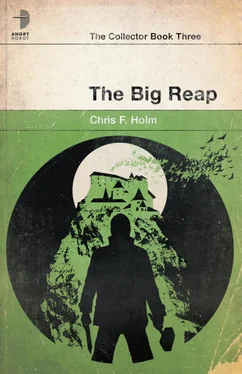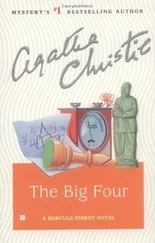“At first, I was pleased with the development as well,” said Yefi. “I even told myself perhaps the light of my presence had dispelled the pall that hung over this poor, afflicted village. After all, I reasoned, I’d seen no overt sign of malignant intent from any of the women I’d encountered here in my conscious life, at least. Perhaps they were as much victims of these visions as was I, and once those visions abated entirely, everything here would return to normal. I even toyed with the idea of posting flyers advertising Sunday mass, the first such public Christian mass this village would have seen in centuries. But then I began to hear the night sounds, and shortly thereafter the children started disappearing. That’s when I realized the evil in this town had not moved on after all. It had simply changed its tactics.”
“What kind of night sounds? And what do you mean, the children started disappearing?”
“They’re hard to describe,” he told me. “Somewhere between a click and a low growl, and a sound like fine-grain sandpaper, or snake-scales dragging past dry leaves. Down by the river, mostly, and only ever at night. And as far as the children are concerned, I mean exactly what I say. Used to be, a day like this, we’d have fifteen, twenty children frolicking about the square. How many did we have today?”
I thought back. “Seven, maybe eight. But that hardly proves they’re disappearing.”
“Doesn’t it? This village has no school. No daycare. Nothing whatsoever for the children to do but entertain themselves while their parents do as parents do to provide for them. So you tell me, where have the others gone?”
“You ask their parents?”
“Of course I asked their parents.”
“And what did they say?”
“They told me to mind my own business. In fact, they veritably begged me to.”
“And what did they say about where the missing children went ?”
“That’s just it,” he told me. “They wouldn’t admit there were any missing children.”
“So their kids were all accounted for,” I said.
“No,” he said. “You misunderstand me. They didn’t claim their missing children were safe and sound. What they claimed was that they’d never had those children to begin with.”
We drank long into the night, the priest and I. Like drunks the world over, we spoke of heaven and hell, of good and evil, of life’s plans sadly scuttled, of love lost or unrequited. We laughed and cried and sang tunelessly the only hymn I knew that was worth a damn the Stones’ “Shine a Light,” off of side four of Exile. And I’ll be damned if this here man of the cloth didn’t know every bloody word.
That song always brought a tear to my eye. Jagger originally penned it for Brian Jones, whose mood swings and struggles with substance abuse had, by ’68, estranged him from the band. Never mind they were on account of the fact that Jones had hell breathing down his neck and damn well knew it. I felt like shit when Jones’ deal came due, but by then, the band he’d sold his soul to found had already left him in the dust — all by the ripe old age of twenty-seven. Lord knows why that’s when rock stars’ deals always come due. Some say it has to do with the number of books in the New Testament, or some Kabbalah nonsense about the twenty-seven names of God. You ask me, that’s just how long it takes for a working class kid with real talent to build himself a set of wings from feather and wax and then fly close enough to the sun to come tumbling back down. I left Jones’ body face-down in his pool, but not before we two shared a drink. Figured what’s the harm? I owed him that much. It seemed like he’d made peace with his fate. Guess it was fitting from the guy whose last recording with the band was “Sympathy for the Devil.”
When I told that poor bastard it was nothing personal, you’d best believe I meant it.
Point is, me and the priest hit it off just fine. I never asked him what drove him to the cloth, and he never asked me just who — or what — I really am. But for one night by the suffuse, drunken glow of ?uica and golden lamplight reflected off of honey-lacquered walls, I remembered what it was like to be in Danny and Ana’s company — to speak freely, without care.
To have a friend.
It wasn’t until dawn broke I broached the topic of my attack.
We’d stopped drinking some hours before. As drunk slid inexorably toward hung over, we both fell silent for long stretches. Not sleeping, but no longer fully conscious, either. After one such stretch, I said to him, “I’ve got to go up there, you know.”
His chin rested lightly on his breastbone. When I spoke, his head jerked upward, and his eyes opened. They swam a moment, as if bobbing atop a choppy surface of ?uica and exhaustion, and then focused. “Go up where?”
“To the castle,” I said.
He shook his head. “You can’t.”
“I have to. That’s where I’ll find the who or what that’s causing all of this. I’m sure of it.”
“You misunderstand,” he said. “I don’t disagree with you on that count. I simply mean you can’t. The castle is… protected.”
“Protected? Protected how?”
“It’s difficult to describe,” he said. “But as one approaches the castle — which none but me have dared since first came to town, so far as I’m aware — there’s this point at which the forest changes. Well below the treeline, some three hundred meters from the castle, is a perimeter encircling the peak whose border is as sharp and well defined as a snow-globe’s sphere. The barrier itself it tinted ever so slightly, as if what lies beyond is being viewed through a pane of dirty glass. The trees outside the sphere are hale and hearty, but those above are withered and gray, as if the sun scarcely reaches them. And yet the barrier itself is not solid. In fact, apart from the pervading sense of dread that envelops you when you approach the place, the unobservant could scarcely be blamed for wandering right through it, although I would hardly recommend it.”
“Why’s that?” I asked, but I was pretty sure I knew the answer. Least if this spell was anything like the barrier Magnusson had employed at Pemberton Baths.
“When first I stumbled upon it, my curiosity got the better of me,” he said, “so I conducted an experiment of sorts. First, I threw a pebble at the barrier. It passed through without incident, neither slowing nor deflecting in the slightest. Then, a pinecone. The result was the same. I’d nearly screwed up the courage to step through myself when I heard a rustle in the underbrush some ten meters to my left. A rabbit, startled from its hiding place by some predator unseen, or, perhaps, by me. It darted toward the barrier by sheer flight instinct, and in the instant before it passed through I swear I saw the animal tense, as if knowing better — as if suddenly realizing its mistake. And when it passed through…”
“Lemme guess, it turned to ash.”
Father Yefi started in surprise. “It did,” he said. “Ash as white as driven snow. And its eyes–”
“Were burned out of its head,” I said, remembering the ill-fated crow outside of Magnusson’s lair. “As if whatever lay inside the barrier didn’t want anyone or anything outside to see what lay beyond.”
“How could you know that? How could you, when I scarcely have the words to describe it myself? In the years that passed since that day, I’ve doubted countless times the veracity of my own memory — wondered if perhaps I had simply imagined it. I assumed I’d fallen victim to the ancient superstitions that plague the simple country folk of my blessed homeland, people too far removed from society to understand the monsters of lore hold no sway in the modern world. But deep down, I never stopped believing what I’d seen. And since that day, I’ve never returned to that Godforsaken place.”
Читать дальше











